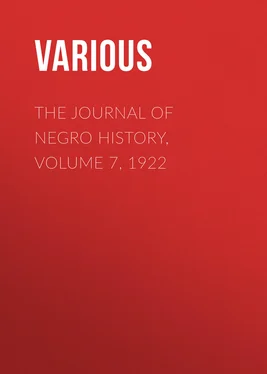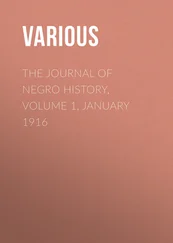Various - The Journal of Negro History, Volume 7, 1922
Здесь есть возможность читать онлайн «Various - The Journal of Negro History, Volume 7, 1922» — ознакомительный отрывок электронной книги совершенно бесплатно, а после прочтения отрывка купить полную версию. В некоторых случаях можно слушать аудио, скачать через торрент в формате fb2 и присутствует краткое содержание. Жанр: foreign_antique, periodic, История, foreign_edu, на английском языке. Описание произведения, (предисловие) а так же отзывы посетителей доступны на портале библиотеки ЛибКат.
- Название:The Journal of Negro History, Volume 7, 1922
- Автор:
- Жанр:
- Год:неизвестен
- ISBN:нет данных
- Рейтинг книги:3 / 5. Голосов: 1
-
Избранное:Добавить в избранное
- Отзывы:
-
Ваша оценка:
- 60
- 1
- 2
- 3
- 4
- 5
The Journal of Negro History, Volume 7, 1922: краткое содержание, описание и аннотация
Предлагаем к чтению аннотацию, описание, краткое содержание или предисловие (зависит от того, что написал сам автор книги «The Journal of Negro History, Volume 7, 1922»). Если вы не нашли необходимую информацию о книге — напишите в комментариях, мы постараемся отыскать её.
The Journal of Negro History, Volume 7, 1922 — читать онлайн ознакомительный отрывок
Ниже представлен текст книги, разбитый по страницам. Система сохранения места последней прочитанной страницы, позволяет с удобством читать онлайн бесплатно книгу «The Journal of Negro History, Volume 7, 1922», без необходимости каждый раз заново искать на чём Вы остановились. Поставьте закладку, и сможете в любой момент перейти на страницу, на которой закончили чтение.
Интервал:
Закладка:
It should be remarked, moreover, that all Negro Baptist churches, except those in the South, which came out of white churches during slavery, had Negro pastors. Yet whatever their differences, Negro Baptists and white Baptists in America constituted one family until after the Civil War. Indeed there has never been any formal separation of the two groups. Each has simply followed the race instinct, in an age of freedom, while the one group cooperates with the other, North and South.
There were Negro Baptist churches in the South for more than a quarter of a century before they began to be constituted in the North, and about a half century before the first church of the kind was planted in the West. When in 1805, moreover, the first African Baptist church was organized at Boston, Massachusetts, it was not only the first Negro Baptist church in the North, but was also the only independent Negro church north except the St. Thomas Episcopal Church of Philadelphia, which had a Negro rector. The Boston African Baptist church had for its pastor a Negro, the Rev. Thomas Paul, a man of such intelligence and piety, such commanding presence and pleasing address, that pulpits everywhere in Massachusetts and in his native State of New Hampshire, were open to him, both before and after he became a minister in that city.
In the course of time Negro Baptist churches tended to associate among themselves, as they developed power independently of the white churches. There were in the South during the Negro's enslavement, however, no Negro Baptist associations which embraced their churches in any State or in any considerable part of a State; for all Negro Baptist churches were associated with white Baptist churches in the South. The "Richmond African Baptist Missionary Society," which was constituted at Richmond, Virginia, in 1815, was no exception to the rule. Lott Cary, 21 21 Let me quote here a paragraph from Sprague's Annals of the American Pulpit , Vol. VI, p. 583, (Ed. 1860, published by Robert Carter and Brother, New York.) The paragraph appears in an article which the publisher takes from Taylor's Memoirs.—Missionary Heroes and Martyrs . "In 1850, the late Rev. Eli Ball of Virginia, visited all the Liberian Baptist Missionary Stations, as agent of the Southern Baptist Missionary Convention, and, with considerable difficulty, ascertained the spot where Lott Cary was buried. The next year, a small marble monument was sent out, and placed over the grave, with the following inscription:— "On the front of the monument was— LOTT CARY Born a slave in Virginia, 1780, Removed from Richmond to Africa, as a Missionary and Colonist, 1821, Was Pastor of the First Baptist Church, and an original settler and defender of the Colony at Monrovia Died Acting Governor of Liberia Nov. 10th, 1828 His life was the progressive development of an able intellect and firm benevolent heart, under the influence of Freedom and an enlightened Christianity; and affords the amplest evidence of the capacity of his race to fill with dignity and usefulness the highest ecclesiastical and political stations Of a truth God is no respecter of persons, But hath made of one blood all nations of men On the reverse— Lott Gary's self-denying, self-sacrificing labors, as a self-taught Physician, as a Missionary and Pastor of a Church, and finally as Governor of the Colony, have inscribed his name indelibly on the page of history, not only as one of Nature's Noblemen, but as an eminent Philanthropist and Missionary of Jesus Christ 'Aye, call it holy ground, The place where first they trod; They sought what here they found, Freedom to worship God.'" That is, indeed, a remarkable utterance, coming from the Southern Baptist Missionary Convention, in the year 1851.
the chief spirit in that organization, and Mr. William Crane, a white merchant, its corresponding secretary, were members of the same church—not a Negro Baptist church, for there was no organization of the kind in Richmond at the time. Lott Cary was converted under the preaching of a white pastor. At the hands of that white pastor he was baptized, into the fellowship of the white church of which that pastor was the spiritual leader Lott Cary was received, and from that white church, the First Baptist Church of Richmond, Virginia, Lott Cary went to plant the standard of Christ on the shores of Africa.
Negro Baptist associations in this country were the achievements of free men on free soil. The Providence Association of Ohio, organized in 1833, and the Wood River Association of Illinois, organized in 1838, led the way. The colored Baptist churches of the North and East organized in 1840, and the abolition of slavery as an American institution resulted in the nation-wide formation of Negro churches, local associations, State conventions, and larger groups. In 1866 a national convention which merged the forces of the North and South, the East and West, under the significant name, "The Consolidated American Baptist Missionary Convention," was organized. Its chief work was in the South and confined to the period of Reconstruction. In 1873 the West revived its organization under the name, "The Baptist General Association of the Western States and Territories," and the Northern churches did likewise in 1875 in the formation of "The New England Baptist Missionary Society." Each enlarged its borders until the two embraced the greater part of the whole country. In 1880 the Negro Baptists of the country formed their first national society to do work in foreign lands exclusively. The organization constituted at this time took the name, "The Baptist Foreign Mission Convention of the United States."
In 1886, at St. Louis, Missouri, the National Baptist Convention was formed, and the work of this organization was subsequently so modified that in it is unified all the national and international church work in which Negro Baptists of America were engaged. These efforts toward organization, however, were not altogether satisfactory, for the Baptists soon developed a factional struggle in regard to the question as to independent action or cooperation with the American Baptist Foreign Mission Society and the American Baptist Home Mission Society. In 1897, in the Shiloh Baptist Church, Washington, D. C., the Lott Cary Baptist Foreign Missionary Convention was formed by certain churches in the Atlantic States which looked with disfavor on the independent mission work as conducted by the Foreign Mission Board of the National Baptist Convention. Composed chiefly of men and women who were educated in the schools of the American Baptist Home Mission Society, this organization has from the first cooperated with Northern Baptists in the prosecution of its work.
At Chicago in 1915 there arose a more serious division in the forces of the National Baptist Convention as the result of differences of opinion in regard to the ownership of the Convention in the lands and chattels of its Publishing Board. As a result of these differences there have developed two groups of colored Baptists in this country, engaged in similar work, and each claims to be the National Baptist Convention—the original and only National Baptist Convention of Negro Baptists in America.
One of the results of the association of Negro churches has been education. Negro Baptists in a land of slavery were not supposed to be versed in the knowledge of books. But inasmuch as master and slave were instructed out of the same inspired writings Sabbath after Sabbath, the slave quite frequently was as familiar with the Bible as his master. Ignorance and illiteracy are not one and the same thing. An unlettered people may be learned in the word of God, and being made wise unto salvation, may present to the world no mean type of Christian life. Apart from the knowledge received through the regular preaching of the gospel by the best preachers of the Southland, it was not unlawful to impart verbal instruction to slaves, in Sunday-school exercises and, under other circumstances, in regard to any number of things which have to do with conduct and character and human comfort, so long as nothing was said to endanger the institution of slavery. But some Baptists appear to have given some measure of literary training to Negroes attached to their churches. Andrew Bryan, in one of his letters to Dr. John Rippon of London, England, in 1800, speaks of the fact that certain white friends in Savannah, Georgia, had purchased a man of color of many excellent qualities, the Rev. Henry Francis, and had given him his freedom that he might be a teacher to his people. Bryan himself then opened a school for the slaves on his plantation outside of Savannah. George Liele established a school in connection with his church in Jamaica, hoping to develop the minds of his communicants that he might properly edify their souls.
Читать дальшеИнтервал:
Закладка:
Похожие книги на «The Journal of Negro History, Volume 7, 1922»
Представляем Вашему вниманию похожие книги на «The Journal of Negro History, Volume 7, 1922» списком для выбора. Мы отобрали схожую по названию и смыслу литературу в надежде предоставить читателям больше вариантов отыскать новые, интересные, ещё непрочитанные произведения.
Обсуждение, отзывы о книге «The Journal of Negro History, Volume 7, 1922» и просто собственные мнения читателей. Оставьте ваши комментарии, напишите, что Вы думаете о произведении, его смысле или главных героях. Укажите что конкретно понравилось, а что нет, и почему Вы так считаете.












